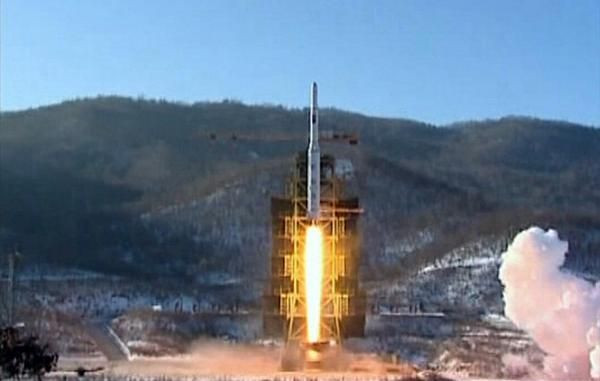South Korea Launches First Satellite Into Space, Weeks After North Korean Launch

South Korea announced the successful launch of a rocket carrying an observational satellite into space on Wednesday. The success is a first for the nation’s space program and comes just weeks after their North Korean adversaries -- still formally at war with them, after the 1953 armistice -- surprised the world by launching their own satellite.
This was the South’s third attempt to launch a manned rocket in the past four years; two previous launches were scrapped after the discovery of technical glitches. South Korean officials are hoping to see signs of the satellite's successful operation by Thursday.
According to the Washington Post, cheering spectators watched as the rocket blasted off from a base near the southwestern village of Goheung. Crowds gathered around public televisions at train stations and other areas in the nation’s capital, Seoul. “I’m proud we have entered the ranks of satellite powers,” one spectator was quoted as saying.
But as many South Koreans are filled with pride, it is hard to ignore the implications of both North and South Korea’s satellite development amid heightened regional tensions in the Korean peninsula.
South Korea’s successful rocket launch was met with little (if any) criticism from the public, and particularly none from the United Nations, angering North Korea. After North Korea’s rocket launch in December, the United Nations Security Council responded by implementing sanctions on the nation for launching long-range rockets. The reason was that the U.S. and South Korea believe that the rocket launch was in fact a test for an intercontinental ballistic missile, with which the nuclear-armed, highly secretive dictatorship could threaten the world.
The satellite does not appear to be functioning, but North Korea’s December launch stirred international controversy after the rocket was surprisingly successful, traveling 10,000 km (6,200 miles), putting West Coast U.S. cities in range.
As a result, the U.S. and its allies called for a U.N. Security Council meeting.
China’s status as one of five permanent members of the Security Council, and lone ally to North Korea, ensured that sanctions as harsh as those imposed on Iran would not be applied to the closed-off nation. As a result, a watered-down resolution was eventually passed. The North Korean government is accusing its enemies and their allies for acting on a double standard between the two Koreas. Pyongyang responded with direct threats of nuclear development and “force” toward the U.S., the “sworn enemy” of the Korean people.
© Copyright IBTimes 2024. All rights reserved.






















